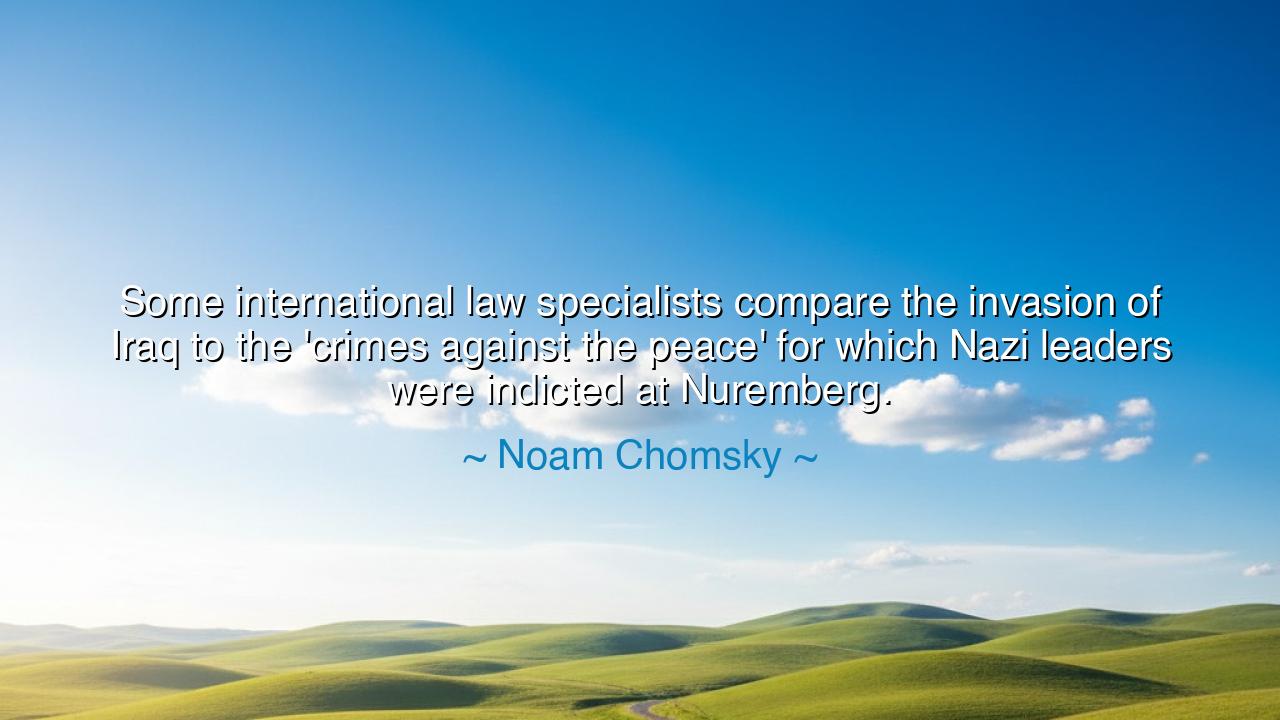
Some international law specialists compare the invasion of Iraq
Some international law specialists compare the invasion of Iraq to the 'crimes against the peace' for which Nazi leaders were indicted at Nuremberg.






Hear the words of Noam Chomsky, the relentless critic of power, who stripped away the veils of empire and spoke with the voice of conscience: “Some international law specialists compare the invasion of Iraq to the ‘crimes against the peace’ for which Nazi leaders were indicted at Nuremberg.” In this stark utterance, Chomsky summons the memory of history’s darkest tribunal and holds it as a mirror to the present. He reminds us that the gravest crime of all is not only violence itself, but the deliberate choice to unleash war upon the innocent—to shatter peace in pursuit of power.
The phrase “crimes against the peace” was forged at Nuremberg after the Second World War, when the victorious powers sought to bring justice to those who had drenched Europe in blood. It was declared that to launch a war of aggression was the supreme crime, for it contained within it the seeds of all others—murder, devastation, cruelty, and despair. By comparing the Iraq invasion to this ancient indictment, Chomsky does not speak lightly; he places modern leaders in the company of those once judged guilty of humanity’s greatest sins.
The meaning is heavy. For if the invasion of Iraq, waged without clear justification and condemned by much of the world, is indeed akin to a crime against peace, then it is not merely a policy error nor a miscalculation—it is a betrayal of the very lessons humanity swore never to forget after Nuremberg. It is a reminder that the strong, when unchecked, may repeat the crimes of the past, cloaking them in new words, new excuses, yet carrying the same bitter fruit: the destruction of nations and the suffering of innocents.
History gives us countless echoes. Recall the Nazi invasion of Poland in 1939, justified with lies and pretexts, yet executed with cruelty that plunged the world into fire. The world, horrified, vowed that never again would nations wage aggressive war with impunity. Yet, decades later, bombs once again fell upon cities, lives were shattered, and leaders defended their actions as necessary for “security” and “freedom.” The parallel is not exact, yet the shadow is unmistakable: the same arrogance, the same disregard for law, the same belief that the powerful stand above judgment.
Chomsky’s warning is thus not only about Iraq—it is about the frailty of justice itself. The Nuremberg Principles declared that no leader, no nation, is above the law of humanity. But what becomes of those principles if they are not applied universally? If justice falls only upon the defeated, but never upon the victorious, then justice becomes not a shield of the innocent, but a weapon of the strong. The very foundations of international law crumble, and peace is left without guardians.
The lesson for us, O children of tomorrow, is clear: we must not let memory fade, nor let law become the servant of power. If we honor Nuremberg, we must hold all nations accountable, not just our enemies. We must speak truth when leaders justify war with falsehoods, we must demand that the same standards apply to all, lest we betray the sacrifices of those who fought for peace before us. To fail in this is to walk again the road that led to ruin in the last century.
Practical wisdom flows from this: be vigilant when war is spoken of. Do not be seduced by words of glory or necessity. Ask: is this war just? Is it defensive, or is it aggression cloaked in noble phrases? Teach the next generation the true meaning of “crimes against the peace”, so that they may recognize when the world is being led astray. And above all, raise your voice against injustice, for silence is the ally of tyranny.
So remember, O heirs of history: peace is sacred, and to shatter it unjustly is the greatest crime. Do not let the mighty escape judgment. Do not let memory be buried. For if we forget, we shall repeat; but if we remember, we may yet preserve the fragile hope that Nuremberg promised—a world where no leader, no nation, and no empire is above the law of humanity.






TCnguyen thi thuy cham
Reading Chomsky’s quote really challenges the way we think about the invasion of Iraq. If we’re drawing parallels with Nuremberg, doesn’t that suggest that we’ve failed to create an international legal system that holds all countries accountable equally? Could this comparison be a wake-up call for rethinking how global law is applied to prevent similar ‘crimes’ from happening again?
GDGold D.dragon
Chomsky's point about Iraq being compared to ‘crimes against the peace’ raises a lot of moral and legal issues. In situations like this, who decides what constitutes a ‘crime against peace’? Is there a way to ensure fairness in international law, or does power always influence whether someone is brought to justice? It makes me wonder if true justice is possible on the global stage when it’s so politically charged.
YCnguyen vu yen chi
I can’t help but feel a bit shocked by this comparison between the Iraq invasion and Nazi war crimes. Is it really fair to put them in the same category? Sure, both are deeply impactful actions with far-reaching consequences, but can we truly equate the two? Or is this comparison meant to highlight the hypocrisy in how we treat war crimes depending on the aggressor’s power and influence?
MLMinh Le
Noam Chomsky's comparison between the invasion of Iraq and the Nuremberg trials raises some uncomfortable questions. If international law specialists see the invasion as a ‘crime against the peace,’ then why wasn’t there more accountability for it? Does this suggest that international law is selectively enforced, or is there something about global politics that allows powerful nations to escape the consequences of such actions?